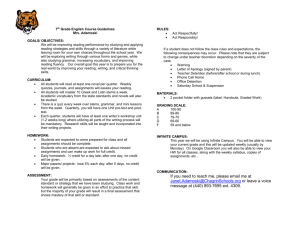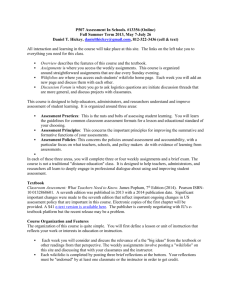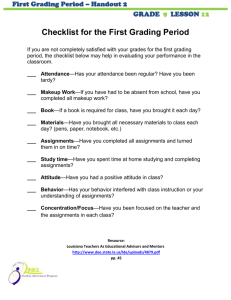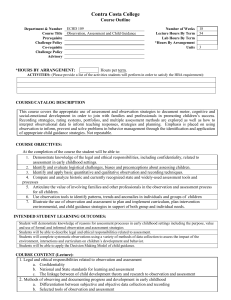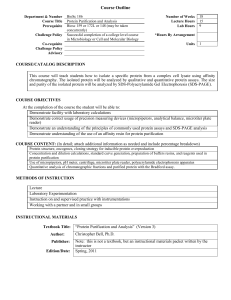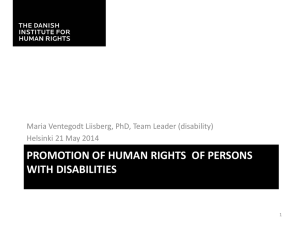course syllabus
advertisement
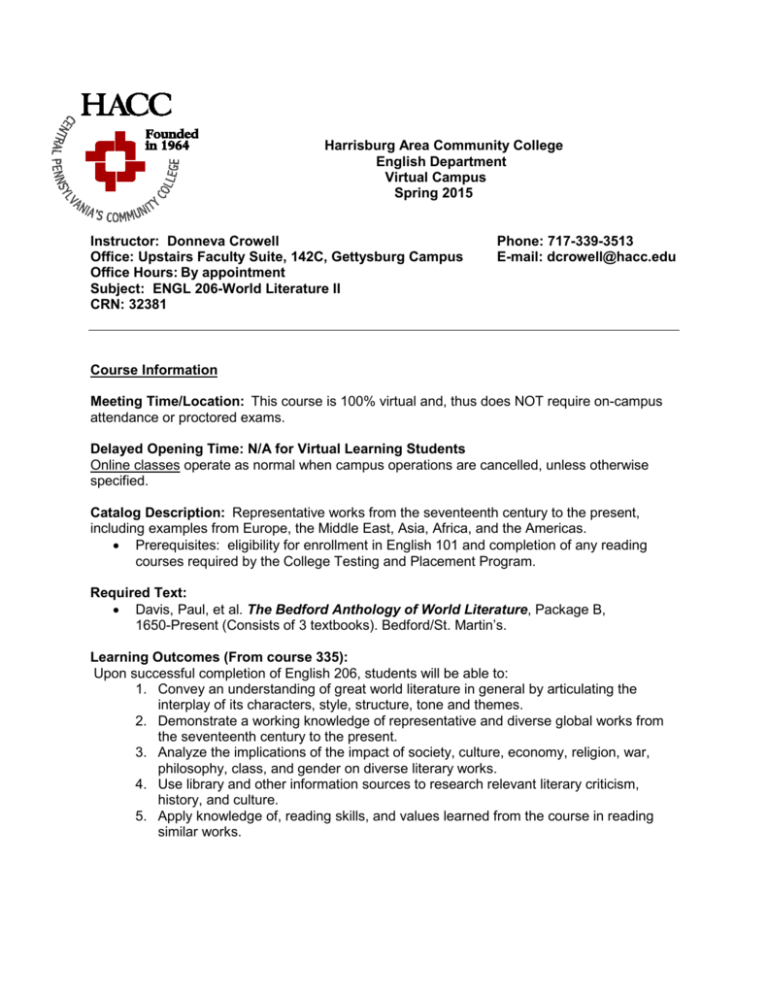
Harrisburg Area Community College English Department Virtual Campus Spring 2015 Instructor: Donneva Crowell Office: Upstairs Faculty Suite, 142C, Gettysburg Campus Office Hours: By appointment Subject: ENGL 206-World Literature II CRN: 32381 Phone: 717-339-3513 E-mail: dcrowell@hacc.edu Course Information Meeting Time/Location: This course is 100% virtual and, thus does NOT require on-campus attendance or proctored exams. Delayed Opening Time: N/A for Virtual Learning Students Online classes operate as normal when campus operations are cancelled, unless otherwise specified. Catalog Description: Representative works from the seventeenth century to the present, including examples from Europe, the Middle East, Asia, Africa, and the Americas. • Prerequisites: eligibility for enrollment in English 101 and completion of any reading courses required by the College Testing and Placement Program. Required Text: • Davis, Paul, et al. The Bedford Anthology of World Literature, Package B, 1650-Present (Consists of 3 textbooks). Bedford/St. Martin’s. Learning Outcomes (From course 335): Upon successful completion of English 206, students will be able to: 1. Convey an understanding of great world literature in general by articulating the interplay of its characters, style, structure, tone and themes. 2. Demonstrate a working knowledge of representative and diverse global works from the seventeenth century to the present. 3. Analyze the implications of the impact of society, culture, economy, religion, war, philosophy, class, and gender on diverse literary works. 4. Use library and other information sources to research relevant literary criticism, history, and culture. 5. Apply knowledge of, reading skills, and values learned from the course in reading similar works. Schedule of Activities: Week 1 1/20—1/25 Week 2 1/25—2/1 (Book 4) Syllabus; D2L information; Introductions; Writing and Discussion details; Japan: The Tokugawa Era (625-630). First selection to read: Chikamatsu: The Love Suicides at Amijima (685-718). Voltaire: Candide (269-74); Ch 1-16 (275-338). Week 3 2/1—2/8 (Book 4, 5, or 6, depending on your choice below) Your choice of one of the following three slave/captivity narratives completed in two readings: Rowlandson: Narrative of the Captivity and Restoration of Mrs. Mary Rowlandson (477-496) & (496-516). Equiano: The Interesting Narrative of the Life of Olaudah Equiano (400-435) & (435-469). Jacobs: Incidents in the Life of a Slave Girl (Bk 5, 754-55, 760-89) and (780801). Week 4 2/8—2/15 (Book 5) Nineteenth Century; Bazán: “The Revolver” & “The Oldest Story” (691-703); Machado de Assis: “Adam and Eve” (918-926). Week 5 2/15—2/22 Flaubert: A Simple Heart (435-461). Ichiyo: “The Thirteenth Night” (1103-1114). Week 6 2/22—3/1 Tolstoy: The Death of Ivan Illych (617-662). Week 7 3/1—3/8 Ogai: “Dancing Girl” (1083-1102). Midterm Break: Mon—Friday, Mar 9-13 Week 8 3/15—3/22 Tagore: Broken Ties, Chapters 1-2 (973-1008). Week 9 3/22—3/29 Tagore: Broken Ties, Chapters 3-4 (1008-1033) Week 10 3/29—4/5 Week 11 4/5—4/12 (Book 6) Borges: “The Garden of Forking Paths” (652-59). García Márquez: “A Very Old Man with Enormous Wings” (924-32). Camus: “The Guest” (812-825) Optional Extra Credit Assignment Week 12 4/12—4/19 Takenishi: The Rite (967-990). Week 13 4/19—4/26 Head: “The Deep River…” & “Snapshots of a Wedding” (1205-1217) Week 14 4/26—5/3 Research Assignment May 4 is the last day to drop a class May 5 is a “reading/make-up day” Finals Week: Wed 5/6 thru Tues 5/12: Complete Final Exam Policies Attendance policy (AP 661, Student Attendance): • Since I cannot actually “see” when you enter the class and cannot always know when you are working on class work, your participation is your attendance and I will consider you “absent” when you do not participate, turn in an assignment, or contact me about such. Simply logging into the class does not constitute attendance. • Many times, students simply stop “attending” (turning in assignments) in a class but do not officially withdraw. It is your responsibility to complete the necessary paperwork to withdraw from the course, but if you accrue three consecutive absences, I reserve the right to withdraw you from the course. • Initial attendance: To be initially counted as having attended the class, you will need to have completed the work for Week 1 by Monday, Jan 26, midnight. Otherwise, you will be dropped from the course. • From the end of the refund period until the midpoint of the course: If you have participated in the class, completed the graded material and have not plagiarized, a “W” grade will be granted upon your request if you need to drop the class during this period. • From the midpoint of the course to the last class period (May 4, 2015): A “W” or “F” will be given to a student who is dropped/dropping, depending upon my assessment of your performance and accounting for any extenuating circumstances. • • • • Last day to drop the class with a full refund: Jan 27, 2015 Last day to drop the class with 50% refund: Feb 10, 2015 Last day to drop without instructor approval and a grade: Feb 10, 2015 Last day to drop the class: final day of classes: May 4, 2015 (by 3:00 p.m.) Academic Dishonesty (AP 594, Academic Dishonesty): Complete honesty is required of students in the presentation of any and all phases of course work. Academic dishonesty, which is taken very seriously in college, is defined as an intentional act of deception in which a student seeks to claim credit for the work or effort of another person, or uses unauthorized material or fabricated information in any academic work. It includes, but is not limited to the following: cheating, plagiarism, and buying or selling of term papers or other course work. In this class, you will automatically receive a grade of zero on an assignment if any part of your written work is plagiarized or if you are caught cheating in another fashion. Makeup Work/Late Penalties Policy: All work must be turned in on the date due. However, if turned in late, there are three late assignment policies: one for weekly assignments, one for major assignments, and one for the final exam: A. Weekly Assignments—make up 60% of your grade! You will soon find out that most of these assignments consist of questions and answers and discussions with your classmates about the reading assigned that week. With class interaction being so important, you will need to complete weekly assignments on time. Thus, you will be allowed only one late day (with a penalty) to complete these assignments. Typically, you are given one week to complete these weekly assignments, which are due by midnight the following Sunday evening. If you turn in your weekly work after midnight on Sunday evening up until midnight Monday evening, you will be deducted ten points, but after that period, any work you do will not be accepted and you will receive a zero for that week’s grade. However, there will be a chance for you to make up one low weekly grade later on in the semester. There will be an optional Extra Credit assignment available the 11th week of class. This assignment will require that you read an additional selection and complete required activities. This assignment will override your lowest weekly grade of the semester. B. Research Assignment—will be penalized using the table below. • One day late 10 points deducted • 2-7 days late 20 points deducted • After one week 0 on the assignment C. Final Exam—may not be turned in late. It is due by the specified date and time and will not be accepted after that. “W” Grade (compliant with AP 667, Grades W, I, Y): “W” Grade - may be awarded to students who have withdrawn or have been withdrawn from a course after the refund period and through the last class meeting of the course. For classes that do not meet in the last two weeks of the term, a ‘W’ grade may be awarded to students who withdraw or have been withdrawn from a course after the refund period and at least three business days prior to the close of the last day of regular instruction as determined by the college. “I” Grade - may be awarded by the approving faculty member to students who, because of extenuating circumstances, request additional time beyond the term to complete coursework. “Y” Grade - may be granted in previously approved courses when the instructor judges that the student has shown sufficient progress but needs more time to complete the course learning outcomes. Grading Procedures: The following are the graded assignment requirements for this class: 13 Weekly Assignments (See “Grading Weekly Assignments” below for details) Research Assignment Final Exam 60% 20% 20% The Weekly Assignments Explained: • Each week, you will receive the work required for the upcoming week. One of the benefits of an online class is the flexibility to do the work on your own schedule, and in this class, students will indeed have some flexibility; however, you will be also required to follow a weekly schedule of work and deadlines. There are several reasons for this. First, discussion is extremely important in a literature class and thus, all students need to be reading and discussing the same works simultaneously. Second, a college-level (and especially a sophomore level) literature class like this one requires (some weeks) a good deal of reading and, thus, if students get behind, it is nearly impossible for them to catch up. And finally, in my many years of teaching, I have found that students feel a certain level of comfort in following a schedule—that is, completing the required work, checking it off in increments, and going on to the next requirement. If you keep up with the class schedule, you will most likely be successful in this class. • Reading the Literature: Most weeks, you will want to plan to spend the first three or four days simply reading: your weekly literature selection(s) as well as the preface material, and any additional study material I will include for you to better understand the selection you are about to read. This will leave you the remainder of the week to complete the activities. After a couple of weeks, you will find a schedule that works for you. Just remember that the key to successfully and more easily completing all of the graded requirements is to read the selections carefully and critically, not merely skimming. (See the “Helpful Hints for Reading” found in the Literature Guidelines folder on the Course Content or Home page.) I would say that on average, you should count on spending a minimum of about five to seven hours of work per week on this class. • Reading Quizzes: In my experience, I have found that many students believe they can skip readings, skim the literature, or simply read various book notes and Sparks notes in order to complete a literature course. However, my philosophy of “teaching” literature classes is grounded in the idea that the students themselves should conduct the majority of the discussions, yet if students aren’t reading, there can be no worthwhile discussion. Thus, graded reading quizzes will be given most weeks and will reward those of you who consistently complete close readings, guarantee that we will have lively and interesting discussions that you will look forward to, and aid your success in writing about the works later on. • Discussion and Dropbox Requirements: o Much of your work in this class involves reading and then discussing those readings. How well you discuss the works can make the difference between a low grade, a passable grade, or an excellent grade in the class. o The discussion requirements will vary from week to week, but most weeks you will be required to (a) post a response to several discussion topics; (b) ask a o o classmate an intelligent question and then respond to his or her answer; (c) write a private answer to a question I ask of you. In any of these instances, you will not simply give your opinion but will need instead to be specific in supporting your answer by using details from the reading to make your case. You will want to think of these answers and discussions as mini-essays: smart, organized, elaborated, detailed, and analytical. Tips on how to discuss literature and a grading rubric for discussion will be permanently placed in the Literature Guidelines folder. • Grading Weekly Assignments: The various weekly activities you complete—discussions, quizzes, private entries—will be given one “holistic” grade based on the criteria above and those found on the “Online Discussion Grading Rubric” previously mentioned (located in the Literature Guidelines folder). In other words, though you may be required to complete several discussion postings and perhaps take a short reading quiz, you will receive only one grade for all that week’s work. These grades will be available for you to view the following week after I have assessed and averaged your compilation of weekly work. Research Assignment Requirements: • The writing assignment is not an extensive piece; it will consist of approximately 1,000-1,200 words (or 4-5 pages). • Format appropriately with the following: your name, date submitted, assignment identification, and final word count in the left-hand corner; (No cover page), a functional title, 12-pt font, and double-spaced. • Read carefully the details of the specific writing assignment and before submitting the final copy, re-read the assignment once again. • Study the specifics on how to write literary analyses essays, which are placed permanently on the course content page (the home page of the course) in a folder labeled Literature Guidelines. • Use proper MLA formatting for your research, both in your text and on the Works Cited page. STUDENTS IN NEED OF ACCOMMODATIONS: Students with disabilities who are in need of accommodations should contact the campus disability coordinator listed below. Coordinators for each campus are listed here: http://www.hacc.edu/StudentServices/DisabilityServices/Contact-Us.cfm EEOC POLICY 005: It is the policy of Harrisburg Area Community College, in full accordance with the law, not to discriminate in employment, student admissions, and student services on the basis of race, color, religion, age, political affiliation or belief, gender, national origin, ancestry, disability, place of birth, General Education Development Certification (GED), marital status, sexual orientation, gender identity or expression, veteran status, genetic history/information, or any legally protected classification. HACC recognizes its responsibility to promote the principles of equal opportunity for employment, student admissions, and student services taking active steps to recruit minorities and women. The Pennsylvania Human Relations Act (“PHRAct’) prohibits discrimination against prospective and current students because of race, color, sex, religious creed, ancestry, national origin, handicap or disability, record of a handicap or disability, perceived handicap or disability, relationship or association with an individual with a handicap or disability, use of a guide or support animal, and/or handling or training of support or guide animals. The Pennsylvania Fair Educational Opportunities Act (“PFEOAct”) prohibits discrimination against prospective and current students because of race, religion, color, ancestry, national origin, sex, handicap or disability, record of a handicap or disability, perceived handicap or disability, and a relationship or association with an individual with a handicap or disability. Information about these laws may be obtained by visiting the Pennsylvania Human Relations Commission website at www.phrc.state.pa.us. HACC—Lebanon Campus and Virtual Learning Deborah Bybee Coordinator, Disability Services 104R 735 Cumberland Street Lebanon, PA 17042 Phone: 717-270-6333 Email: dabybee@hacc.edu
